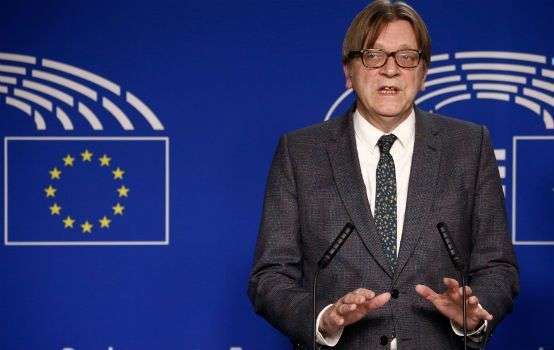
In response to its offensive against the Kurdish Syrian Democratic Forces (SDF), a number of European nations have implemented arms embargoes on President Recep Tayyip Erdoğan’s Turkey. Italian Foreign Minister Luigi Di Maio has confirmed that Rome will cease arms exports to Turkey, despite being its largest supplier.
Beyond these economic sanctions, European politicians have also criticized the United States for making way for invading Turkish forces. Former Belgian prime minister Guy Verhofstadt, a senior member of the European Parliament, used the opportunity to once again call for a European army:
The US withdrawal from Syria and the Turkish offensive have once again demonstrated Europe’s geopolitical weakness. It are now turkey and Russia who decide on our safety. Europe must take its destiny into its own hands by building a real Defense Union. https://t.co/0OOXzFO8uI
— Guy Verhofstadt (@guyverhofstadt) October 14, 2019
Advertisement
He also qualified the American decision as “short-sighted”—no surprise for a man who applauded Trump’s attacks on Syria in 2018.
Norbert Röttgen, the chairman of the German parliament’s foreign affairs committee, tells the Washington Post, “In withdrawing U.S. troops from Northern Syria, Trump not only let his Kurdish allies down, he also enabled the Turkish invasion in the first place. As a consequence, U.S. credibility has been badly damaged and the regional stability is now at serious risk.”
French foreign minister Jean-Yves Le Drian suggested in a statement that the U.S. had betrayed the Kurds.
Whether or not Trump’s decision to move American troops out of northern Syria amounts to a betrayal is one for the foreign policy commentators to work out. But let’s look instead at the EU track record of standing up to Turkey. The European Union is quick to explain that it has removed the accession candidate status of Turkey (which had been ongoing since the 1980s), following that nation’s regression in the rule of law and increase in human rights abuses.
It is also likely to be less vocal on the migrant deal it passed in 2016. That year, as the refugee crisis was heating up European politics, UK polls showed that Brexit was becoming more likely. With general elections looming in Spain, presidential elections in Austria, and some key federal state elections in Germany, the EU was looking for a way to stop the influx of new migrants into the continent. Greece—which serves as the main entry point for most migrants from the Middle East—was being flooded with people arriving on the shores of its islands, who ended up being held in detention centers that were insufficient to meet their needs. The Dublin treaties on refugees made clear that if rejected in Greece, refugees could not re-apply in other EU countries. Germany, however, disregarded the rules and accepted people into Central Europe. With the rules now broadened and Greece crumbling under the weight of refugees, Brussels decided to bring in Turkey and make a deal.
The following rules came out of the negotiating room with Ankara:
- All new irregular migrants crossing from Turkey to the Greek islands as of March 20, 2016 would be returned to Turkey.
- For every Syrian returned to Turkey from the Greek islands, another Syrian would be resettled in the EU.
- Turkey would take “any necessary measures” to prevent the opening of new sea or land routes for irregular migration from within its own borders to the EU.
In return, Turkey was promised that its accession talks with the European Union would be “re-energized.” Joining the EU would give Turkey access to free trade with all member states, boosting its economy, as well as very large funds to renovate its infrastructure. On top of that, the EU promised progress in talks for visa liberalization, which would allow Turkish citizens to freely travel within the European Union.
To top it all off, €6 billion ($6.62 billion) was given to Turkey to accept these refugees. Essentially, the EU was using Ankara’s might to create a gigantic prison for people it did not want to accept into Europe. Many of these people are now staying in Turkey perpetually.
As a result of these payments, Turkey has taken up its part of the obligation, and increased its intake of refugees from just above 4 million in 2016 to close to 6 million this year. Many of them live in very rough conditions. And while Ankara cashes in the money from Europe, it also deports thousands of refugees back to Syria, confiscating their legal documents and belongings in the process. Last year, Human Rights Watch reported, “Turkish authorities in Istanbul and nine provinces on or near the Syrian border have stopped registering all but a handful of recently arrived Syrian asylum seekers.” That’s the dark secret about the arrangement: the EU has made Turkey its external border patrol, enabling it to steal from innocent people harmed by military interventions that European countries participated in.
So if it’s time to get tough on Turkey, the question really is—who goes first? And maybe the Europeans might want to think twice before they criticize the U.S. for enabling Ankara’s bad behavior.
Bill Wirtz comments on European politics and policy in English, French, and German. His work has appeared in Newsweek, the Washington Examiner, CityAM, Le Monde, Le Figaro, and Die Welt.
Sourse: theamericanconservative.com






